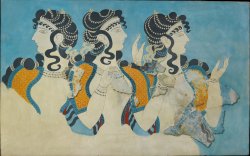A Work in Progress: The Montclair State University International Center for the Health Humanities – by Brian Abrams and Lois Oppenheim
Posted in: Guest Essay

The Health Humanities (conceived as a unified entity) is the application of humanities disciplines (arts, literature, languages, law, history, philosophy, religion, etc.) to discourse about and the expression and/or promotion of the dimensions of human health and well-being. As a construct, it may be understood as situated at one end of a polar continuum, opposite the health sciences (or biomedical, behavioral, and social sciences). While this applied capacity of the humanities is not itself a novel idea, the construct of the Health Humanities as a meta-discipline has only recently begun to emerge, more precisely, over the first decade of the 21st Century.
In the Health Humanities, health (and the promotion of health) is understood according to the constructivist (and other non-positivist) principles indigenous to the humanities, as opposed to the positivism of science. The Health Humanities model does not serve to replace the health sciences, but rather to offer a contrasting (and potentially collaborative) epistemological paradigm and a pragmatic approach with respect to health (mental and physical—understood as deeply interrelated) and its promotion. In large part, its foundations are grounded historically in the Medical Humanities, but they transcend the scope of the Medical Humanities in humanities-based conceptualizations of health and the applications of the humanities for health promotion. The Health Humanities construct, moreover, is distinct from complementary and alternative medicine, which essentially consists of non-conventional interventions applied within a conventional health sciences context.
The Health Humanities is a growing movement internationally. A conference on the Health Humanities was held October 13-15, 2006, at Green College, University of British Columbia. In January 2009, Paul Crawford became the world’s first Professor of Health Humanities at The University of Nottingham and, with Dr. Victoria Tischler, Charley Baker, Dr. Brian Brown, Dr. Lisa Mooney-Smith and Professor Ronald Carter, created an international Health Humanities initiative that included the establishment of a biennial International Health Humanities Conference (IHHC) funded by the Arts and Humanities Research Council (AHRC) of the United Kingdom. The first such conference was held August 6-8, 2010, at The University of Nottingham, United Kingdom. The conference opened with Professor Crawford’s address entitled “Health Humanities: Literature and Madness” and included keynote lectures by Professor Kay Redfield Jamison and Professor Elaine Showalter. Mark A. Radcliffe, who also spoke at the conference, reported on “Health Humanities” in his weekly column for Nursing Times. The conference was also reported in the Bethlem Blog. The second conference (IHHC) will be hosted at the University of Colorado in 2012, with a theme of “Film, Media and Health.” Planning is underway for the third in 2014, also to be held in the USA. Montclair State University has been invited by IHHC representatives potentially to serve as the site for that conference. Plans are also in place to establish an international society and scholarly journal on the Health Humanities.
Professor Paul Crawford of the University of Nottingham (en route to a meeting at Harvard University) came to Montclair State last month to meet with interested members of the University faculty, with representatives from the College of the Arts and the College of the Humanities and Social Sciences. Following this meeting, Professors Lois Oppenheim of CHSS and Brian Abrams of CART discussed the possibility of creating a Montclair State University Center that would promote scholarship and pedagogy in this new field, which would distinguish Montclair State as the first institution in North America to house such a center, and would actively promote the Health Humanities. The International Center for the Health Humanities would be very much aligned with Montclair State’s current emphases on interdisciplinary and international program development. A task force composed of members of CART and CHSS is leading the charge in establishing the Center—however, it the hope that it will eventually involve all of the University colleges, and that the voices of a diverse constituency will allow the new Center to flourish.
Montclair State’s International Center for the Health Humanities will be linked via the forthcoming journal, the bi-annual conference, and other modalities to work already taking place in the UK and elsewhere. In this regard, the University would serve as a North American “hub” of a new and rapidly developing field, rendering it the model for program-building initiatives involving new cross-curricular coursework and pedagogy, and opportunities for community engagement and service learning (including partnerships with health care institutions). Also possible is the establishment of new academic programs in the Health Humanities, with concentrations located in specific disciplines.
SOURCES
http://en.wikipedia.org/wiki/Health_humanities (Retrieved Sept. 18, 2010)
Squier, S. M. (2007). Beyond nescience: The intersectional insights of health humanities. Perspectives in Biology and Medicine, 50 (3), 334-337
http://www.emua.ac.uk/downloads/BBsept09/healthhumanities.pptx
“Medical Humanities – BMJ Journals”. Mh.bmj.com. (Retrieved July 5, 2010)
http://www.healthhum.arts.ubc.ca/
http://www.madnessandliterature.org/Resources/IHHC-flyer.pdf
http://www.madnessandliterature.org/Resources/First-International-Health-Humanities-Conference-Programme.pdf
“Madness and Literature: Report from International Health Humanities Conference,” 16th August 2010.
